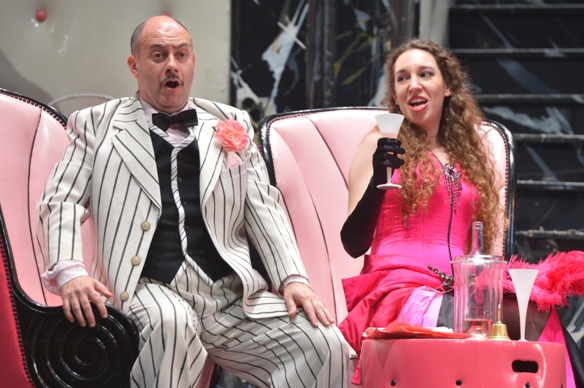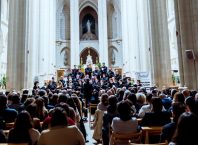The Israel Opera’s performance of Don Pasquale, which premieres this week, is shaping up to be a fabulous show. In the title role of Norina (alongside Israeli favorite Hila Baggio) is soprano Shiri Hershkovitz, one of Israel’s most prominent young stars.
Last week, after a long grueling day of rehearsal, Shiri Hershkovitz met with me over sachlav to talk about her rapidly-growing career, her musical tastes, and her performance in Don Pasquale.

How did you get started?
“I was born with a passion for singing. It was all I wanted to do, all day.”
So you were one of those kids who sing all the time?
“I was! And I would make up my own songs and put on shows for my grandparents.
“When I was six I started taking piano lessons, but I didn’t really enjoy myself. My teacher suggested that I sing along while I played, and when she heard me sing she said, ‘Oh, what a lovely voice you have.’ I started singing in a choir, and later joined the Kfar Saba children’s chorus. Twice a week I would take a bus from Kochav Ya’ir to Kfar Saba. Then in high school I chose to go into my school’s music program, where the head of department, Sima Rolnik, was a real mentor to me, and still is. In high school I also met Doron Ben-Ami, a composer, singer and pianist, who became a good friend.”
And was it always classical music for you, or did you develop a taste for it later?
“For me it was musical theatre. Whenever and wherever we traveled abroad, my parents would take me to see a show. I developed a real passion for the genre. Later when I was in the Moran Choir, I was known as the ‘musicals singer’ – every time ‘Summertime’ or ‘Over the Rainbow’ was on the program, I was given the solo.”
“In high school I did volunteer work with AKIM [a charity organization that strives to help people with various intellectual disabilities]. When I had to do my Bagrut [matriculation] recital, I wanted to do a “practice run” before performing. I went to the Kfar Saba municipality and asked to do a charity concert, with all proceeds going towards a trip for the children of AKIM. Then Doron [Ben-Ami] and I joined forces and made that AKIM concert a tradition, performing for three straight years. It was an opportunity to make music with friends, and do something for a cause I believe in.”
So how did the transition to classical music begin?
“In middle school, my first singing teacher, Edith Bigel, worked with me on musicals. Then I started studying with Efrat Ben-Nun, who taught me to sing classical music and worked with me on texts in Italian, French and German. She built the classical singer in me, and she still comes to see me perform.”
“In the army I was accepted into the Excellent Musician program, and had to choose between that and an intelligence job. Of course, I was overjoyed to be chosen for the music program. After the army, I decided to go to school abroad, because I was looking for a good musical theatre program. After applying to a lot of colleges, I decided to attend the Boston Conservatory of Music, where the musical theater is particularly strong, but my studies focused on classical singing. My teacher Dr. Rebecca Folsom, is my anchor in the crazy world of opera. She really built me as a singer.”
And that was when classical music took over?
“That happened in my third year at Boston Conservatory. Every summer when I went home I would perform in recitals at home or in local concert halls. That summer, my friend Doron surprised me by bringing a certain Maestro David Sebba to the concert. I almost choked! I was 22 and had never sung for an important conductor. The recital was half classical and half musicals, jazz and Israeli songs. Dudi [Sebba] told me, ‘We need to talk.’ Because I was going back to Boston, I could only meet with him the next evening. He told me to sing an aria from Cosi fan tutte which I’d sung the night before, as well as a song from musical theater. Then he said, ‘You’ve got one foot in classical music and one foot in musical theater. The musicals influence the classical and vice versa. You have to choose. You have to focus.’ When he asked me who my favorite classical singer was, I had no idea what to say.”
“He gave me a CD of famous classical singers and told me to go on a ‘diet’, because my ear and my voice were subconsciously assuming the traits of musical theater singers instead of my classical-music education. I didn’t know what to do – how can I give up musicals and all my favorite singers? Doron advised me to give it a chance. For a year I surrounded myself with classical singing. After two months my voice had undergone a transformation: it opened up, became more round. I auditioned for the part of Atalanta in Handel’s Serse. That changed my life. I was at a crossroads, and when Dudi told me to choose, he lit the way for me into the classical world.”
Today you seem to be focused on opera.
“I sing mainly opera but Michael Ajzenstadt [artistic director of the Israeli Opera] knows how much I love musicals, and sometimes I get an opportunity to sing. For example, I sang Christine’s aria from Phantom of the Opera at an Israel Opera concert. If I had to choose, though, I would probably choose to sing Norina.”
What’s your dream role?
“In musical theatre, Christine in Phantom of the Opera. In opera, Violetta in La Traviata – in June this dream came true for me when I sang the role in Fidenza, Italy, in a festival for young singers with the Parma Orchestra.”
In Israel the musical theater scene is a little sleepy, no?
“Sometimes theater companies do musical theater but it’s very different from Broadway. If I had chosen a career in musicals over opera, I probably would have found myself singing abroad. In Israel I have more opportunities in opera.”
“I also have to mention the Meitar Opera Studio, which was a wonderful experience for me. After five years in Boston, I was thinking what to do next. I auditioned for an opera program in Amsterdam, but I was really homesick. When I was accepted to the Meitar program, after a three-stage audition process, I was happy to return to Israel.”
“It’s really an amazing program for young singers. First, you get to experience audiences of all kinds: from Eilat to Kiryat Shmona, you perform for children, give classes to high school students, perform with the greatest orchestras in Israel, and you get small roles in Israel Opera performances. You get to attend master-classes with directors from all over the world and you get a chance to work with world-renowned conductors. You get a chance to really get into the world of opera. It was so good to work with David Sebba and with Michael Aizenstadt, who cares so much about singers, about Israelis, and wants to give them opportunities. My abilities improved immensely during my time there, and I’m sure it’s thanks to the studio I got to sing Violetta last year – it’s a direct result of my two years in the program.”
You have really excellent diction and a great theatrical approach. Did you study acting and foreign languages?
“I studied French in school, and I would have probably studied French in college if I hadn’t gone into music. Then at Boston Conservatory I had mandatory courses in Italian, French and German. Italian is my favorite language and I never miss a chance to speak it. I visit Italy once a year and I’ve been practicing my speaking skills with my Italian co-stars in Don Pasquale.
As for acting, I think it’s very important in opera. A good friend in high school, who was in the theater program, told me how crucial theater skills are for a singer. I took a course at Yoram Loevinstein’s school and also studied acting at Boston Conservatory. With acting skills you can bring much more to the production, and to the director.”
What makes a good director, in your opinion?
“A good director is one who has a clear concept of the opera, who has ideas about the characters, and for whom nothing onstage is accidental – everything should be anchored in the text. I also enjoy working with directors who give the singers room to bring something of their own to the stage. I like to have an open dialogue with the director, so that everyone can create something together.”
What do you think of the experience of performing for children?
“Oh, I love it. It’s a lot of fun, and the Israel Opera has a great education program which tries to expose kids to this strange genre. Opera has a certain image in Israel, but I believe it’s all a matter of education. Children should at least get a chance to be exposed to opera. I saw how they all get drawn into the story, and I try to get them involved in it. For instance, when I sing Pamina, I turn to the children and ask them, ‘What should I do about Tamino? What should I do about my mother?’ and when they see the Queen approaching they try to warn me: ‘Look out, she’s behind you!’ They really get into the story and laugh and get scared in all the right places.”
What about high schoolers?
“We have an education program for high schoolers, too. Usually, kids who aren’t music students respond with laughter at first, when they hear the high notes. They’re embarrassed. I like to sing Rosina’s aria for them, and sometimes I sit on someone’s desk and try to act it out, to involve them in the story.”
“They see music as something intimidating, something ‘high-class’, but it really isn’t – opera was written for the middle class. Mozart, for example, loved to make fun of the upper class and the aristocracy.”
You took part in the lecture-concert dedicated to Wagner a few weeks ago, which turned out to be pretty crazy. What was that like?
“Well, the concert itself got cancelled so Efrat Ashkenazi and I were asked to sing at the conference instead. We studied some repertoire just for this concert – La Juive, Der Freischütz, and a few songs of Nietzsche’s, which are less well known. We sang some arias and duets and as we were going offstage, this man got off his seat, hopped onstage and started singing ‘Hatikvah’. He got to the end and told everyone to go home, that the concert was over. People in the audience started booing him, and he accused them of ‘kashering the varmint’, that by mere discussion they were preparing Israel for performances of Wagner’s music. He became really violent and started pushing the piano towards where we were sitting, and that’s when we left the stage. He wasn’t just angry, he was raging. The security guards tried to subdue him and that scene went on for about half an hour before the police came. It was not a pleasant experience. Very violent. This was probably the worst experience I’ve ever had on stage.”
What’s the scariest thing about singing opera?
“I have a pretty bad fear of heights. At the Met I saw a production of Romeo et Juliette where they had to sing a duet on a bed that was ‘floating’ over the stage, and in the Israel Opera’s [David Pountney] production of Rigoletto, Gilda sings ‘Caro nome’ while standing on her glass ‘cage’. If I ever have to do something like that, I’d tell the director that I can’t do that.”
You’re singing in Menotti’s The Telephone soon. You’ve performed this piece before, right?
“I performed it with Oded [Reich] last year, in another production by Shirit Lee-Weiss. Now we’re performing it with the Israel Chamber Orchestra conducted by Yoav Talmi. I’m really looking forward to it – I’m crazy about Lucie. I’ll be singing with Oded again and if Shirit Lee-Weiss will direct, it’ll be a really colorful production, really funny.”
With iPhones?
“Yes, with a lot of technology! We’ll also be performing the Israeli premiere of The Return from Abroad by Mendelssohn, and Naxos will be recording that performance.”
Don Pasquale. What’s your favorite part?
“Wow. I have a favorite part in every act. The duet with Dottore Malatesta is one, because in the Studio I sang it with Oded Reich [the Notary in Don Pasquale], who is a good friend, and with David Sebba conducting and Shirit Lee-Weiss directing, we had a lot of fun. Destroying Don Pasquale’s house is another fun part – I love going wild onstage. Then when he comes back I turn his house around completely – I get all-pink furniture and I’m wearing a pink dress, and I tell him I’m going to the theatre and tell him to go to bed. Then, I give him a slap.”
A slap? For real?
“Absolutely. You should come see it!”
There’s something bitchy about Norina, something maybe a little cynical. She doesn’t seem to be too impressed with the romance novel she’s reading, in ‘Quel guardo il cavaliere’.
“Deep inside, she’s reading that story and she really wants to believe what she’s reading, to believe in the white knight. But she’s a widow and she’s experienced a thing or two in life. I don’t see it as cynicism, but as a kind of confidence; and she likes to enjoy life and to have fun – ‘mi piace scherzar‘. Besides, she’s the one main female character and these three men are constantly hovering around her – Malatesta keeps trying to flirt with her, Pasquale wants her, Ernesto is in love with her. She enjoys having that kind of power.”
Do you think audiences today will relate to Norina? Would you recommend Don Pasquale as a first-timer’s opera?
“Absolutely. It’s the perfect first-theater-experience opera. The music is catchy and light, it’s very funny, and the plot is easy to follow and it’s more fast-paced than other operas. For young people today, who are used to instant gratification and constant action, this opera can be a perfect fit. It’s also very colorful, and young. And the tenor is really cute. It’s definitely a great opera for first-timers.”
Don Pasquale premieres Tuesday, February 18th, with performances continuing until March 1st. Ticketholders can enjoy special perks such as backstage tours, pre-performance lectures and talks with the singers. Visit the Israeli Opera’s website, www.israel-opera.co.il, for more details and ticket prices, or call 03-692-7777.
For details on Menotti’s The Telephone and Mendelssohn’s The Return from Abroad (scheduled for early March) call 03-5188845 or visit www.ico.co.il.





